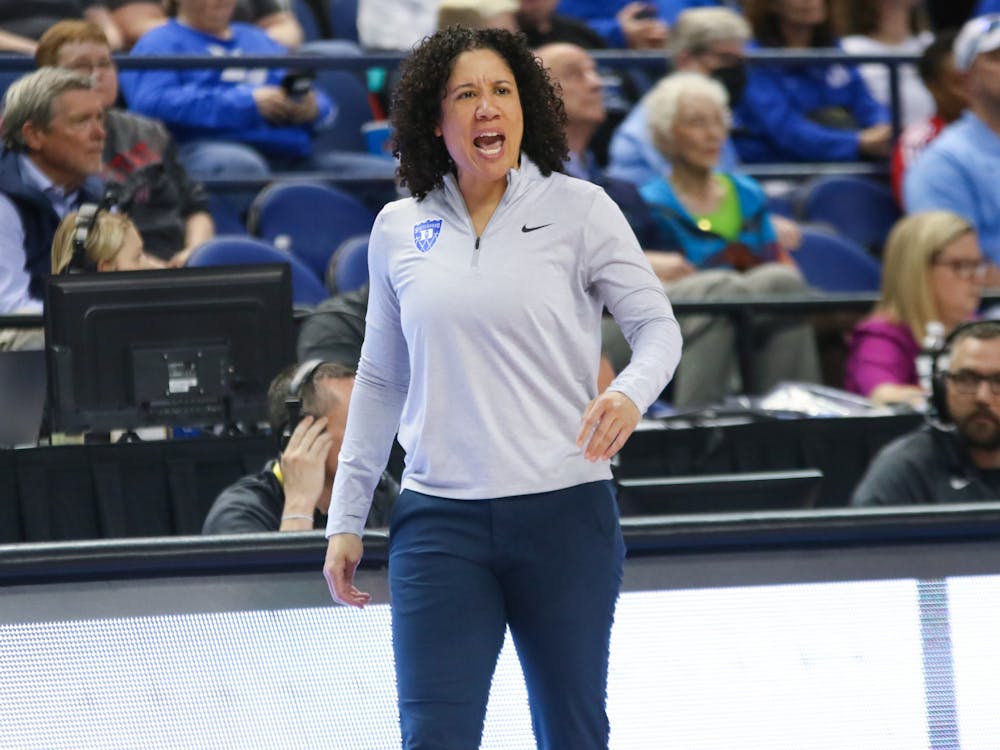It was the shot heard ‘round the world. Well, almost.
With 1.2 seconds on the clock and a tie to break against the eighth-ranked team in the country, Blue Devil men's basketball phenom Kyle Filipowski went to the rim in hopes of earning a road victory against Virginia. In his way stood the likes of Ryan Dunn and Reece Beekman, the two Cavalier guards tasked with sending the contest into overtime. The Westtown, N.Y., native let the ball go while the buzzer echoed around John Paul Jones Arena, but a foul was called on the play.
After minutes of waiting with bated breath while the referees stood over the monitors, the call was overturned to send the teams into overtime. While Duke ultimately lost the Feb. 11 matchup 69-62, it got its consolation prize in a statement from the ACC admitting to the incorrect nature of the call.
The men made headlines for the referees’ misstep in that infamous game, but just two weeks earlier, an arguably more catastrophic blunder was committed. This time, it impacted none other than Kara Lawson and her record-breaking women’s squad.
In a 70-57 loss to Florida State Jan. 29, internal investigations revealed that the entire first half of the contest was played with a men’s regulation ball. After alerting the head official at halftime about the mixup, the second portion of the game was played with the correct equipment. While it may not seem like a big deal for such a mixup to occur, the slight differences between the men’s and women’s rocks are enough to flush a contest down the drain.
However, unlike Filipowski and the men’s program, the ACC made no conciliatory statement of misconduct. Rather, they sat silent until Lawson spoke up after a home win against Pittsburgh. The conference released a statement the following morning.
“If I wanted to appeal and protest the game, [the ACC] would not allow me to do that,” said Lawson. “This would never happen in a men’s game.”
Of all the fiery statements, those last eight words encapsulate the controversy that has plagued college basketball for decades. In an era where arguments for “equal pay for equal play” have dominated discussions in the collective sports consciousness, women’s basketball still has tremendous strides to make. After all, it was just two short years ago that the NCAA got called out for their horrendously different accommodations for the men’s and women’s March Madness tournaments — a fully outfitted weight room against a rack of dumbbells is far from equality.
For years, women’s sports have been plagued by the guise that the men’s game brings more popularity, more views and more revenue. This excuse for the sports gender hierarchy is an extremely outdated view. Just take a look at the 2023 NCAA tournament.
For a seat at the men’s Final Four in Houston, tickets averaged a price of $234. On the women’s side, the chance to witness greatness in Dallas had an average going rate of $331. What’s more, the championship matchup between LSU and Iowa shattered the previous viewership record, garnering 9.9 million views for the women’s title.
Beyond all of that, female athletes continue to turn in stellar performances despite their undervaluation. The Blue Devil women arguably turned in a better season than the men in the 2022-23 campaign, earning second overall in the ACC while only losing four contests in the conference. Senior Celeste Taylor earned ACC Defensive Player of the Year honors while becoming a semifinalist for the Naismith Defensive Player of the Year Award, and the team earned a No. 3 seed in the NCAA tournament and narrowly missed out on a trip to the Sweet 16.
The men may have the ACC tournament in their pocket, but the success of the year belongs to the women, both at our school and in the nation at large. There’s a reason why the next Steph Curry is a woman from Iowa.
So while the ACC turned a blind eye in January to its blunder in such a high-stakes women’s basketball game, deeming it a blip on its radar, this sort of response is far from how it should be.
“The lack of accountability is staggering,” said Lawson of the ACC’s initial silence. “When you make a mistake, you own it and you own it right away. You don’t pass the puck.”
It is time for women to get the attention, media coverage and respect they deserve without the asterisks. The future of college basketball lies with the women moving it forward. With that, the ACC and NCAA can help lead the charge by treating the men’s and women’s games with the same reverence.
Get The Chronicle straight to your inbox
Signup for our weekly newsletter. Cancel at any time.

Mackenzie Sheehy is a Trinity junior and associate editor for The Chronicle's 120th volume.

